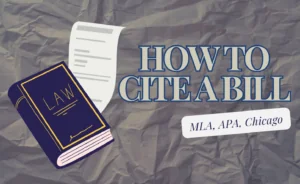Gone are the days when the only research for your papers came from books that smelled older than your grandpa’s attic. Blogs have taken center stage as a go-to for fresh, insightful info, especially when you’re trying to spice up your academic work. But here’s the kicker: citing them can be a bit like trying to solve a Rubik’s Cube blindfolded. Or even looking at it. But fear not! Citation isn’t as impossible to figure out as the cube, and we’ve got the lowdown on how to nail those with our free citation generator.

✅ AI Essay Writer ✅ AI Detector ✅ Plagchecker ✅ Paraphraser
✅ Summarizer ✅ Citation Generator
How To Cite A Blog: General Rules
A burger from one place never tastes like a burger from down the road Similarly, citing blogs in your papers varies depending on the style guide you’re following. But before you start pulling your hair out, relax. They all basically need the same ingredients from you: the blog author’s name, the post’s title, when it was posted, and where you found it. Easy.
😎 The Blog Author’s Name: No need to explain this in detail. You need the name of whoever the blog belongs to or the name of the author of your particular article or post. Finding the author’s name is usually straightforward—it’s often at the top or bottom of the post.
🏷️ The Post’s Title: The title of the post is typically bolded, larger in font, and sits at the top of the page. It’s what you clicked on to get there in the first place, so you can’t miss it.
🗓️ When It Was Posted: Like checking the date on a loaf of bread, knowing when a blog post was published helps your readers understand the context and relevance of the information. Look around the title or the bottom of the post for a date stamp. If it’s a bit hidden, some light scrolling should uncover it.
🔗 Where You Found It (URL): The URL is the web address in your browser’s address bar when you’re viewing the post. It’s crucial for guiding your readers back to the source of your information.
How to Cite a Blog in APA
If your institution or discipline requires APA, consider yourself lucky. This style is relatively simple. Let’s break it down. Start with the author’s name, flip the calendar to the post date, grab the title, and don’t forget the URL.

In-text citations:
In APA, you typically include the author’s last name and the year of publication. For direct quotes, also include the page number or, for online sources without page numbers, a paragraph number, section title, or a direct quote.
(Ellen, 2024)
How to Cite a Blog in MLA
Citing in MLA can be also quite simple of you think of citing in this style as of telling a story: Who (author), What (title), When (date), and Where (URL).

In-text citations:
MLA format requires the author’s last name and the page number for print sources. Since blogs don’t have page numbers, you can simply use the author’s last name.
(Ellen)
How to Cite a Blog in Harvard
All about that Harvard life? It’s all about giving credit where it’s due. You’ll need the author, year, title, blog name, and that crucial URL.

In-text citations:
For Harvard, the author’s last name and the year of publication are used. If you’re quoting directly, also include the page number or equivalent if there are no pages.
(Smith, 2022)
How to Cite a Blog in Chicago
To create a correct citation in the Chicago style you’ll need all the same information. Here is how you need to place it according to the requirements – the author, title, blog name, date, and URL.

In-text citations:
Chicago style typically uses footnotes or endnotes for in-text citations. The number corresponds to a footnote or endnote that provides the source’s full details.
1. Nayelli Ellen, “Teachers Seek AI Training: Over 70% Lack It,” AcademicHelp.net, March 26, 2024, https://academichelp.net/blog/edtech/teachers-seek-ai-training-more-than-70-had-none.html.
Look, we get it. Citing sources might not be the most thrilling part of writing your paper, but it’s like putting on a seatbelt—it’s essential. Plus, getting it right means you’re showing respect to the people whose ideas you’re sharing. So, whether it’s APA, MLA, Chicago, or Harvard, just pick your flavor and roll with it. Remember, each citation style is just a different way to tell the world where you got your killer info. Happy citing!
FAQ
Follow us on Reddit for more insights and updates.





Comments (0)
Welcome to A*Help comments!
We’re all about debate and discussion at A*Help.
We value the diverse opinions of users, so you may find points of view that you don’t agree with. And that’s cool. However, there are certain things we’re not OK with: attempts to manipulate our data in any way, for example, or the posting of discriminative, offensive, hateful, or disparaging material.